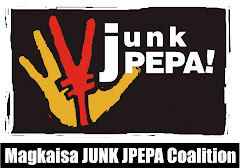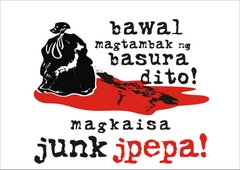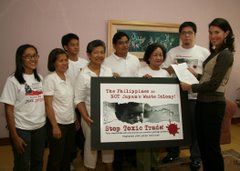12 August 2008, Quezon, City – “The threat posed by toxic wastes in the JPEPA is very real for Filipinos. It behooves our Senators to address this threat and not pretend that it is not there,” stated Marie Marciano, President of Mother Earth Foundation and a member of the multi-sectoral movement called the Magkaisa Junk JPEPA Coalition (MJJC) that held a creative protest in front of the Senate today.

Members of various environmental groups participated in the creative protest in which mock figures of President Gloria Macapagal-Arroyo and Senators Mar Roxas and Miriam Defensor-Santiago sat on toxic waste barrels marked JPEPA, miming the common phrase “see no evil, speak no evil, hear no evil”. In this instance the three figures are metaphorically washing their hands of JPEPA and the toxic waste nightmare it will bring.
In May of 2007, Japanese Foreign Minister Taro Aso executed a side note expressing Japan’s promise not to export hazardous wastes to the Philippines, as long as it follows Philippine and Japanese laws, as well as the international treaty on toxic wastes known as the Basel Convention. According to Atty. Richard Gutierrez, Executive Director of Ban Toxics!, it is not sufficient to rely on Japan’s promise not to export toxic wastes to the Philippines because there are physical and financial incentives for Japan to export its wastes.
Citing data from the Japanese Ministry of Environment, Gutierrez stated that Japan has been generating over 50 million tons of wastes per year for the past 10 years. Because of their continued generation of waste Japan only has 13.2 years left of physical space in their landfills to dispose of their municipal waste. For their industrial wastes, the Japanese only have 6.1 years left in their landfills.
“It’s simple physics, two bodies cannot occupy the same space at the same time. You either move the Japanese out of Japan or you move the waste out of Japan. This is a no brainer,” stated Gutierrez.
“In terms of cost, the Japanese are spending 2 trillion Yen per year to deal with their wastes,” continued Gutierrez. “Why not export these wastes in the guise of raw materials to poorer countries and save money on the processing cost in Japan? This is a win-win for Japan and a major loss for the country accepting the toxic wastes.”
The environmental groups also mentioned that Japan is struggling with the growing cases of illegal dumping within its borders and data from Thailand and India have revealed that Japan is already exporting toxic wastes to these countries under existing Japanese and international laws.
According to Marciano, the promise to follow laws is not sufficient. “We need to take into account that all these laws define toxic wastes the same way and that they are all implemented rigorously. The fact that Japan is able to export toxic wastes to Thailand and India for the past three years is evidence that Japanese law and the Basel Convention do allow toxic wastes exports.”
In her privilege speech to the Senate sponsoring the ratification of the controversial treaty, Sen. Defensor-Santiago expressly stated that the Senate is recommending to Malacañang the ratification of the Basel Ban Amendment.
“If Malacañang does not endorse the Basel Ban Amendment to the Senate for ratification, this will recommendation will go nowhere,” said Gutierrez “Filipinos have the Constitutional right to a healthful ecology. This is a right based on a legal obligation not on convenience. The Filipino health and environment must constantly be protected, and not when it is politically convenient.”






1 comment:
Nice site. This Site provided me a very useful and important information. is very interesting, and full of informative Social Site thanks; i m seo expert blogger. Online Home Based Work, I Have a website On Video Entertainment KDrama Engsub . Please Visit Us my Site https://dramacools9.net
Post a Comment